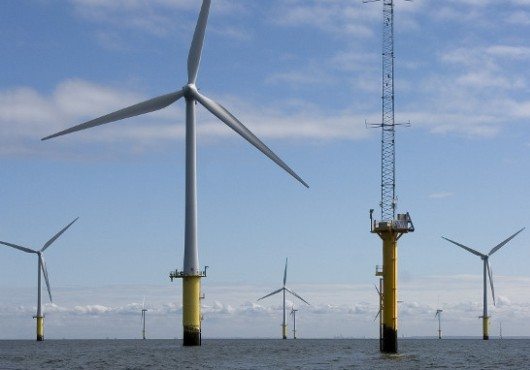A new report has concluded that the falling costs of offshore wind will result in offshore wind projects installed after 2020 being cost-competitive with new gas plants.
The report, published by BVG Associates and commissioned by Statkraft UK, the UK division of Norwegian state-owned electricity giant Statkraft, concludes that “tangible advances in technology, the supply chain, and policy” have all combined to drive down the cost of offshore wind. These pressures will continue to drive down the cost of offshore wind projects, and BVG Associates predict that projects going into construction in 5 years will be competitive with new gas plants.

In fact, BVG Associates concludes that repowering existing projects with the most modern turbines could, in fact, from the late 2020s, see offshore wind projects that are cheaper than gas projects, “even under the Government’s lowest gas price forecast.”
“This is a radical step towards ‘subsidy’ free offshore wind and will enable the UK to continue to decarbonise through the 2020s, cost-effectively,” the authors of the report noted in their executive summary.
The report also predicts that the thriving UK offshore wind industry will be able to deliver:
- A world leading manufacturing and construction supply chain directly creating almost 18,000 long-term, direct jobs by 2025 in manufacturing, construction and operations, mostly in the Northern Powerhouse and coastal areas with traditionally high levels of unemployment
- A significant global export opportunity worth over £200 billion, which will see UK-based companies provide products, services and knowledge to markets throughout Europe, Asia and the USA, replicating the success of North Sea oil and gas and significantly contributing to UK productivity
“Thanks to Government support the UK is the world leader in offshore wind energy – it’s part of our long term plan to foster enterprise, innovation and create jobs as we decarbonise at the lowest cost to hardworking bill payers,” said Amber Rudd Secretary of State for Energy and Climate Change. “We want to help technologies stand on their own two feet, not encourage a reliance on public subsidies and the report points towards progress in this direction.”
“I welcome the findings of BVG’s report, which suggest that offshore wind has a valuable role to play in a cost-effective, secure energy mix,” said Jon Vatnaland, Managing Director of Statkraft UK. “Encouragingly it also indicates the scale of the potential contribution to the UK economy. This is great news for consumers and plans for growth and productivity.”
The full report is available via Statkraft.
This article was originally published on CleanTechnica






